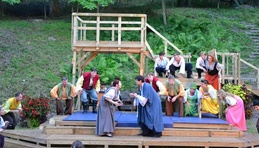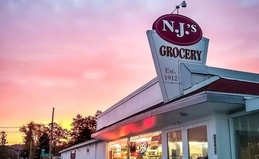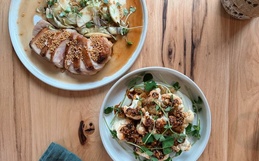In Search of a Fair Deal: Mayan Coffee Growers Share their Story
Oct. 27, 2004
Life in the coffee plantations of Chiapas, Mexico is anything but easy. For more than a decade, the Mayan descendents who live in this remote province of jungles and mountains in southern Mexico have been caught up in a rebellion with the federal government over land reform and labor issues. In between encounters with Mexican troops and paramilitary goons which are humiliating at best and sometimes deadly, the indigenous people of Chiapas struggle to make a living through subsistence farming or by growing coffee.Last week, participants at the Bioneers Conference in Traverse City learned firsthand of the struggles of one small village when Fair Trade dealer Chris Treter of Higher Grounds Trading Co., brought Macario Arias Gomez and Josè Perez Vasquez some 2,000 miles north to tell their story.
Macario is president of the Maya Vinik organic coffee cooperative in Chiapas while Jose is president of Las Abejas (“The Bees“), a non-violent group seeking a better life for the residents of Chiapas through faith-based resistance.
With Treter serving as an interpreter, the two described their efforts to create a better life for their people. Their story starts with the massacre of 45 people, mostly women and children, who were praying in a chapel at a refugee camp in Acteal in 1994 when some 70 paramilitary thugs surrounded the building. Although the chapel was only a 500 feet from a Mexican military post, the troops did nothing to prevent the butchery, which included cutting open the stomachs of four women to kill their unborn babies. Fifteen of those murdered were children.
At the time, Zapatista rebels were fighting the Mexican government and its paramilitary death squads. “The Bees, an indigenous rights organization, stood up and said they didn‘t support violence, but did support the goals of the rebellion,“ Treter says. “As a result, they were targeted by the paramilitary, beaten, assassinated, and forced to live in refugee camps.“
“The difference is that the Zapatistas are an armed struggle, while we are a peace organization that supports the same ends,“ Josè notes.
“Our people struggle for dignity, justice and liberty, but the weapons we use are faith and the word fo God,“ Macario adds. “When there is a conflict, we fast and pray rather than taking up arms.“
An international outcry ensued after the Acteal massacre, and the rebellion itself has tapered off, but survivors of the war were faced with the difficulty of trying to make a living in an exploitive global economy. Unscrupulous middlemen called “coyotes“ made it nearly impossible for the people of the village to make a living.
“Before 1999, we were selling to the coyotes and not making enough to eat and were extremely poor,“ Marario says.
That year, however, the Maya Vinic coffee cooperative of 476 families was launched, raising organic coffee which is purchased by dealers such as Treter who are dedicated to the Fair Trade principles of providing indigenous people with a living wage.
“Now, we‘re the largest buyer of Maya Vinik coffee in the U.S. and one of our goals on this trip is to find other buyers who will support the village,“ Treter says. He adds that he and his wife Jodi underwrote the costs of bringing their guests to Northern Michigan in thanks for the many times they‘ve been received in Chiapas. The two have also arranged for Suttons Bay to be the sister city of Acteal.
Treter says that the Higher Grounds brand is the only 100% Fair Trade coffee in Michigan that works directly with native growers. Typically, the coffee is shade-grown and organic (poor growers can‘t afford pesticides), raised by families on an average of two acres of land.
Both Macario and Josè have seen the rough side of their country‘s struggle. Macario was beaten in 1997 because he was promoting health and education reforms in the area. Josè continues to endure threats, intimidation and the possibility of jail for heading up The Bees. Both had friends who died in the massacre.
But life is slowly improving for the people of the Maya Vinik co-op as word spreads on the importance of buying Fair Trade products. Locally, you can buy Higher Grounds coffee at the Grain Train, Oryana, the Cedar Market, Java to Go, and various restaurants in the region.
Trending

Theater in the Park with Lakeside Shakespeare Theatre
Lakeside Shakespeare Theatre (LST) in Frankfort hosts their big week of the summer July 23, 24, 25, and 26 at Tank Hill (188… Read More >>
Northport Is a World of Pure Imagination
The Northport Performing Arts Center (NPAC) troupe has not taken the stage since 2018. But this summer, for the first time i… Read More >>
A New Home for NJ's Indian Eats
On June 10, a fire broke out at NJ’s Grocery in Lake Leelanau, and though no one was hurt, there was enough fire and s… Read More >>


